|
|
| |
|
COLLECTING 007 – UK Records
WRITTEN &
COMPILED BY KEVIN HARPER |
|
 |
|
Every James Bond film
from Dr. No (1962) to Licence To Kill (1989) had its
original soundtrack recording issued as a 33rpm 12" Long Playing
vinyl record.
Beginning with the release of GoldenEye (1995) the soundtracks
were
only issued on Compact Disc. The resurgence in the popularity of vinyl
records in recent years has resulted in the re-release of several classic
James Bond soundtracks in this format, with the track listings identical
to the
original version. The long-awaited 25th James Bond film No Time To Die
(2021) also had its soundtrack released on vinyl alongside the
standard CD edition. The double-LP is unique in that it included four
bonus tracks not featured on the CD release.
|
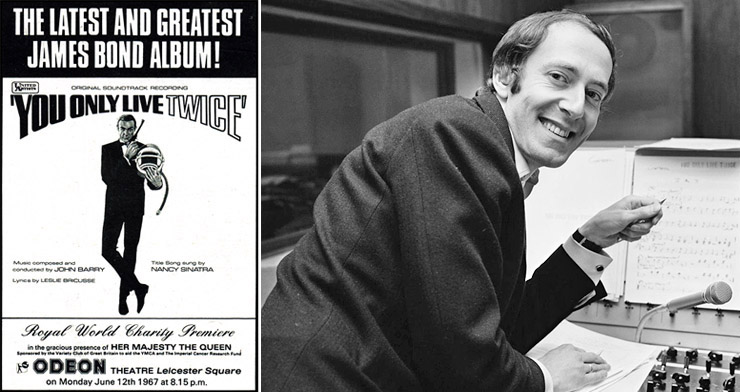 |
|
Although the title song
for each film had been issued as a 45rpm 7" single by the artistes own
recording label, contractually their performance was also included on the
soundtrack LP as the opening track. This practice ended with Die
Another Day (2002), and only Quantum of Solace (2008) and No
Time To Die (2021) later included the title song, but this time placed
as the last track on the album. All James Bond soundtracks up to and
including Moonraker (1979) were released by United Artists Records.
Subsequent soundtracks have been issued by the title artistes own record
label. The double-sided LP format also dictated the track listing of the
album, with side two usually opening with an instrumental version of the
main theme, or another song featured in the film. Some tracks were also
edited or created from two or more separate cues featured in the film,
whilst other were occasionally recorded just for the album. LPs
were also restricted to a playing time of around 45-minutes over the two
sides and the inclusion/omission of some tracks from some scores became a
source of debate among fans for many years. It was only in the 40th
anniversary year of James Bond in the cinema that remastered extended
Compact Disc versions of the soundtracks were released. Lukas Kendall's
groundbreaking series of James Bond soundtracks issued by
EMI in 2003 restored many of the missing tracks, and in some cases doubled
the length of the original album. Contractually the track listings for the
original part of the album remained the same, with bonus tracks appearing
at the end of the programme. Some album tracks were also expanded or
adapted from their original release but retained their relative place in
the listing. Until the release of the expanded CDs the James Bond
soundtracks available on vinyl record were the closest thing to owning the
film in the days before videotape and DVDs. For many fans the
soundtrack albums remain an integral part of the James Bond experience and
collectible items in their own right.
|
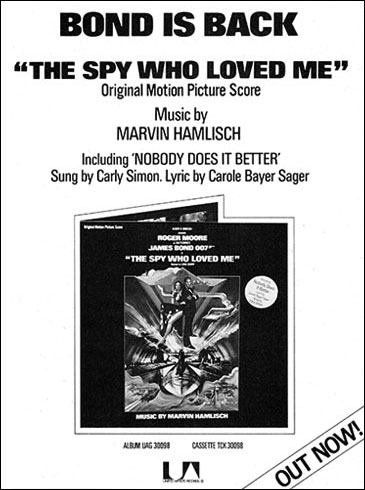 |
|
The soundtrack LPs
for the first five James Bond films were issued simultaneously in both mono and
stereo versions, but the only changes to the record sleeve was a
different catalogue number and revised lettering. Dr. No did
not have a vinyl LP release in the UK until July 1965. From Russia
With Love was therefore the first James Bond soundtrack album to
be released in the UK in October 1963. It should be noted that the
first track of the album ‘Opening Titles: James Bond Is Back - From
Russia With Love and James Bond Theme’ is a different arrangement
to that heard over the main titles in the film. The album version does
not feature the prominent organ solo played by Alan Haven (1935-2016)
on the film recording. Additionally, the tracks ‘The Golden Horn’,
‘Guitar Lament’ and ‘Leila Dances’ do not feature in the film. The
naming of four tracks on Side One of the UK Thunderball LP were
changed for the US release. Collectors should note that the US LP
releases of Goldfinger and You Only Live Twice
originally had different track listings to their UK counterparts. The
UK LP of
Goldfinger omitted John Barry's instrumental version of the
main theme, although this did appear on the 7" EP. The US LP of
Goldfinger included the instrumental but omitted the tracks
‘Golden Girl’, ‘Death of Tilly’, ‘The Laser Beam’ and ‘Pussy Galore's
Flying Circus’. These four tracks did not have a US release until 1992
when they appeared on Disc Two of ‘The
Best of JAMES BOND 30TH ANNIVERSARY COLLECTION’ Limited Edition
CD. |
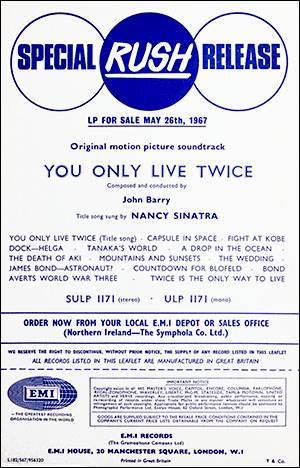 |
The 2003 remastered EMI Compact Disc release was a
hybrid of both albums and presented the most complete version of the
score then available. The
2024 60th
Anniversary Limited Edition CD release from US independent label
La-La Land Records re-sequenced the score into film order.
La-La Land also released
two special
vinyl Limited Editions of Goldfinger later in 2024.
The US LP of You Only Live Twice
featured Nancy Sinatra's reprise of the title song as the last track of
the album, whereas the UK version replaced this with John Barry's ‘Twice
Is The Only Way To Live’. The 2003 EMI remastered CDs restored all these
missing tracks. The original UK soundtrack album for
You Only Live Twice was rush released on May 26, 1967 although the
film would not premiere until June 12th in London, and did not go on
general release until mid-August. This meant that anyone purchasing the
record before seeing You Only Live Twice in the cinema would know
that the character of Aki (played by Akiko Wakabayashi) died in the film
as a consequence of the naming the final track on Side One of the album.
Licence To Kill (1989) marked the
last time a James Bond soundtrack would have its first release issued on vinyl until the long-awaited No Time To Die
in 2021.
Subsequent films have had their albums released exclusively on compact disc with the title song artistes releasing their own CD singles, padded out with remixes
and redundant extended versions of the song. Although all James Bond
title themes have been released as a 7" singles since 1989; these were not
all commercially available, and frequently only supplied as promotional
copies. |
|
|
Hans Zimmer's soundtrack for No Time To
Die was originally due to be issued in April 2021 and then withheld
when the release of Daniel Craig's final James Bond film was delayed for a
third time. The inclusion of interpolations of John Barry compositions
from On Her Majesty's Secret Service (1969) in the score could be
regarded as plot spoilers and Decca Records wisely chose to delay the
album release until No Time To Die finally hit cinemas in October
2021. The title song (performed by Billie Eilish and co-written with her
brother Finneas O'Connell) had been released on February 13, 2020. Despite
the delay in cinematic debut of No Time To Die, the song was
nominated for and won the award for Best Song Written for Visual Media at
the 63rd Annual Grammy Awards on March 14, 2021. ‘No Time To Die’ was
therefore an award winner six months before the film was eventually
released due to the song itself being issued during the 2019–20
eligibility period. ‘No Time To Die’ was included as the final track on
the soundtrack album, and went on to win the Golden Globe and
Academy Award for Best Original Song in 2022, the third successive James
Bond song to achieve this honour. |
|
UK 33rpm 12" Long Playing Records |
|
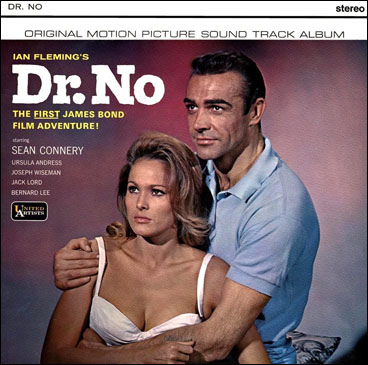 |
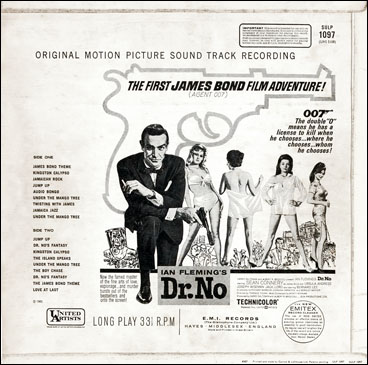 |
|
Dr. No
Original Motion Picture Sound Track Album
United Artists Records ULP 1097 Mono (July 1965)
United Artists Records SULP 1097 Stereo (July 1965) |
|
|
|
Dr. No did not
have its soundtrack album released when the film originally played in
UK cinemas in October 1962. At this time it was unusual for films to have
their orchestral score released as a standalone album unless they were
based on a stage musical, or a high-profile biblical epic. It was not
until after Dr. No had been released in the USA and become a
substantial commercial hit, that
United Artists hastily
issued a vinyl soundtrack album in June 1963. The album would not
be available in the UK for another two years, and the rear sleeve even
carries the identifying number ‘6507’ to signify it was released in
July of 1965, although the copyright date on the record label itself
was 1963. The serial number ULP/SULP 1097 also confirms its position in the
United Artists catalogue; following Goldfinger (ULP/SULP 1076), but
pre-dating Thunderball (ULP/SULP 1110). Compiled by United Artists
executives, the resulting record was an odd mixture of songs featured
in the film; John Barry's arrangement of ‘James Bond Theme’ heard
over the main titles and throughout the film (although never in its
entirety), and just two pieces of incidental music composed by Monty
Norman. The tracks ‘The Island Speaks’ and ‘Love at Last’ are actually featured in Dr. No, with the rest of the
album made up of pieces recorded by Monty Norman in Jamaica, and curious unrelated tracks such as
‘Audio Bongo’ and ‘Twisting with James’, which are not heard in
the finished film. With the choice of music, and naming of tracks done
by people not connected to the film, the resulting album was as odd
then as it is now. Whilst it was not uncommon for tracks (or indeed
complete albums) to feature music inspired by a particular film, the
Dr. No soundtrack stands alone as it does not really represent
the music or style of the film. John Barry's own score to Zulu
(1964) was only featured on the A-side of the original 1964 soundtrack
album, with the B-side comprising upbeat jazz/pop versions based on
the
themes he composed for the film. |
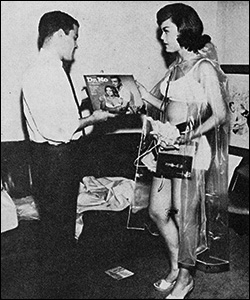 |
|
ABOVE: (left) United
Artists executive Joe Prior and model Pat Lane travelled
across the USA promoting the release of Dr. No in June
1963. A hastily issued soundtrack album was compiled by UA
executives after the film had become a substantial hit in the
USA. The
United Artists pressbook makes no mention of the
Dr. No original soundtrack album, indicating it was not prepared
when the film was first released in the USA in early May 1963.
(right) United Artists took out a full page advertisement in the
May 25, 1963 issue of Billboard magazine announcing the
release of the Dr. No original sound track music, which is
the earliest printed reference to the album. |
|
|
|
As the original
Dr. No recording sessions no longer survive, any expanded release
could only come from what exists on the Music & Effects tracks that were
used to create the final sound mix for the film in 1962. Several bootleg versions
purporting to be ‘expanded editions’ of the Dr. No soundtrack album
feature a few short pieces of music composed by Monty Norman (1928-2022)
and actually heard in the film, but these have all been sourced from the
Music & Effects track available on the US laserdisc edition of Dr. No
issued by Criterion/Voyager in 1991, and subsequently withdrawn
after EON Productions and MGM took exception to some of the comments
made on the separate commentary track by several of the filmmakers
(including director Terence Young and editor Peter Hunt), and
threatened legal action unless the audio track was edited. A similar
M&E track (and controversial commentary) was also available on
Criterion's laserdisc of
Goldfinger, which included those short pieces of music
composed by John Barry not featured on the original
soundtrack album. |
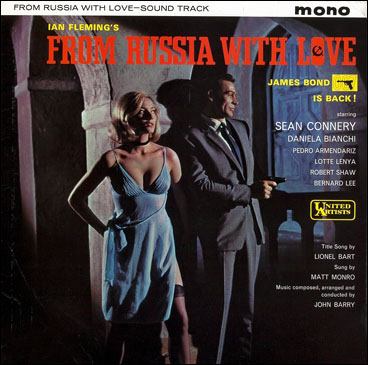 |
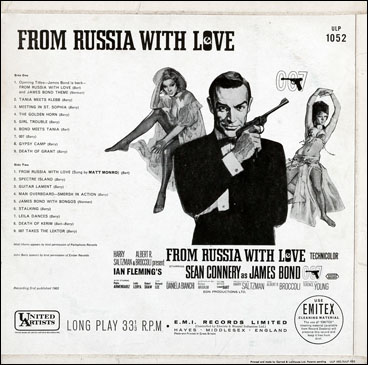 |
|
From Russia With
Love
Sound Track
United Artists Records ULP 1052 Mono (October 1963)
United Artists Records SULP 1052 Stereo (October 1963) |
|
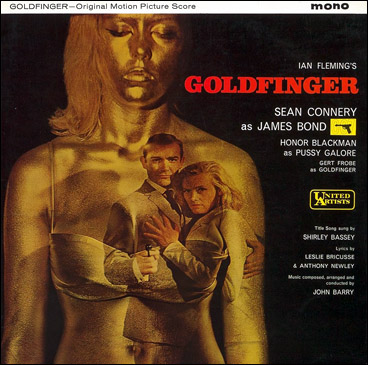 |
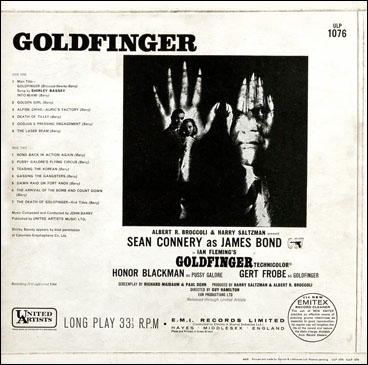 |
|
Goldfinger
Original Motion Picture Score
United Artists Records ULP 1076 Mono (October 1964)
United Artists Records SULP 1076 Stereo (October 1964) |
|
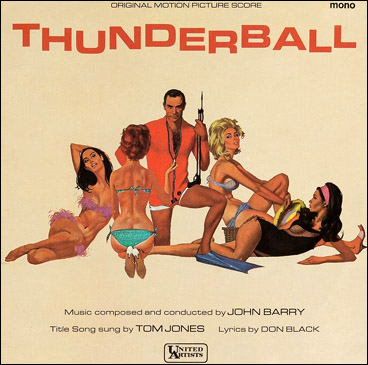 |
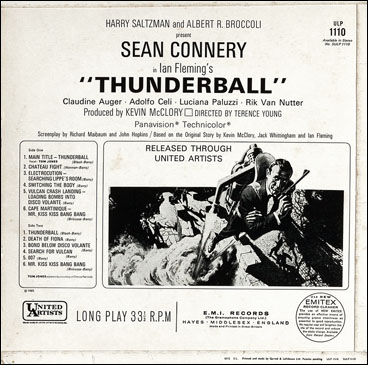 |
|
Thunderball
Original Motion Picture Score
United Artists Records ULP 1110 Mono (December 1965)
United Artists Records SULP 1110 Stereo (December 1965) |
Note: Track #6 on Side
One mis-spells ‘Café Martinique’
as ‘Cape Martinique’. This was corrected on the US album
and subsequent CD releases. |
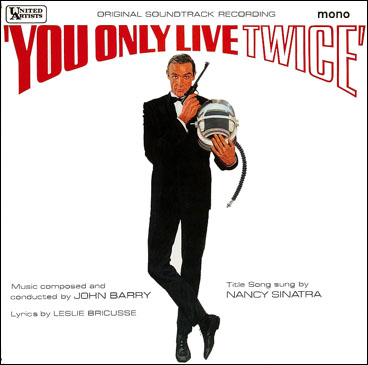 |
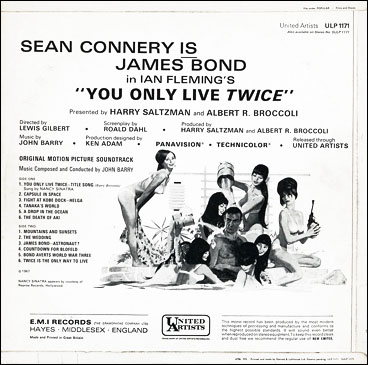 |
|
You Only Live
Twice
Original Soundtrack
Recording
United Artists Records ULP 1171 Mono (May 1967)
United Artists Records SULP 1171 Stereo (May 1967) |
|
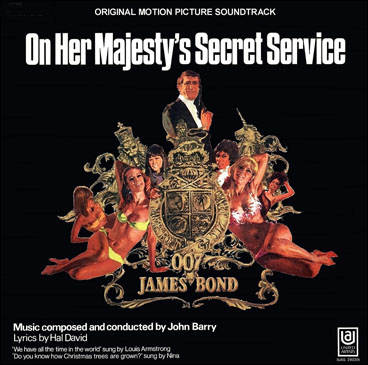 |
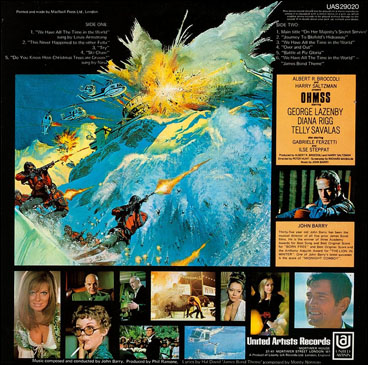 |
|
|
|
On Her Majesty's
Secret Service
Original Motion Picture Soundtrack
United Artists Records UAS 29020 Stereo (December 1969) |
The original UK pressing featured a gatefold sleeve with an
illustration of George Lazenby as James Bond by Yves Thos |
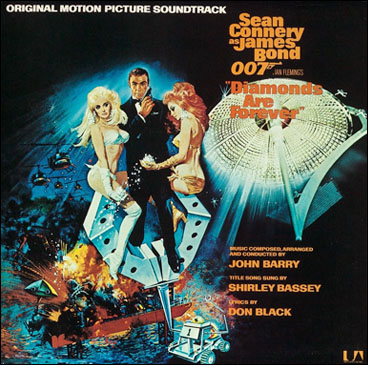 |
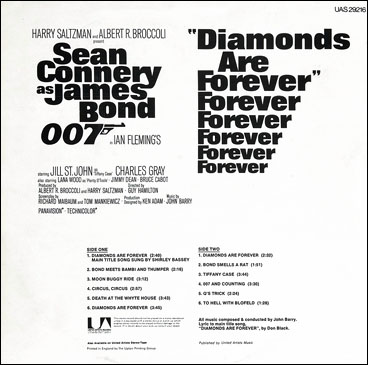 |
|
Diamonds Are
Forever
Original Motion Picture Soundtrack
United Artists Records UAS 29216 Stereo (November 1971) |
|
|
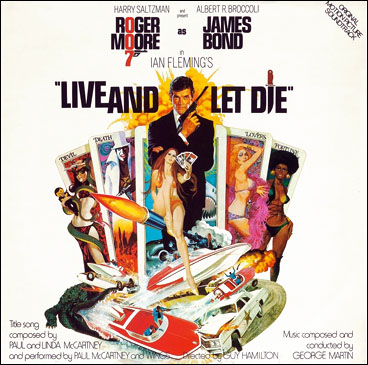 |
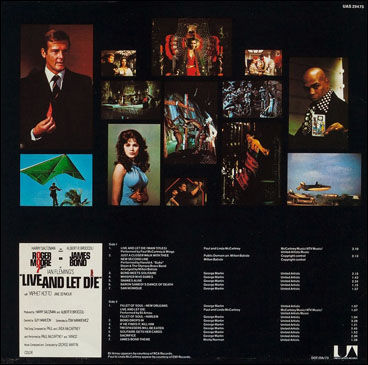 |
|
Live And Let Die
Original Motion Picture Soundtrack
United Artists Records UAS 29475 Stereo (July 1973) |
|
|
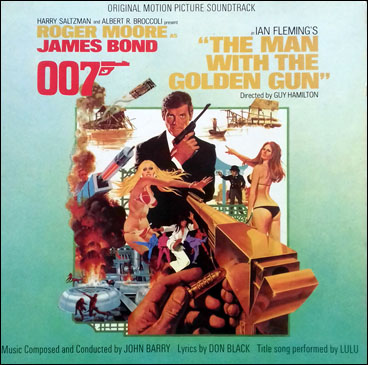 |
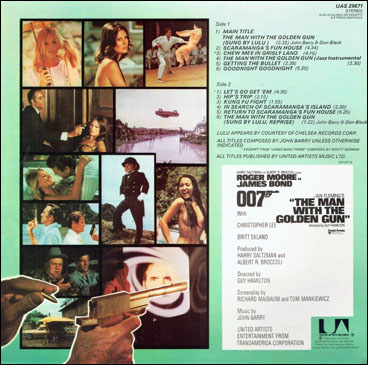 |
|
The Man With The
Golden Gun
Original Motion Picture Soundtrack
United Artists Records UAS 29671 Stereo (December 1974) |
|
|
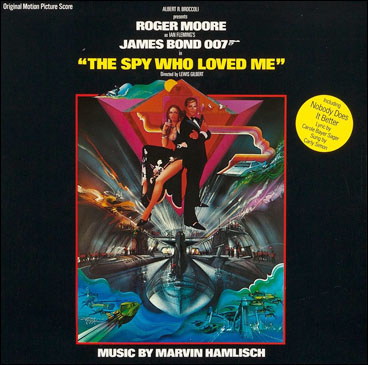 |
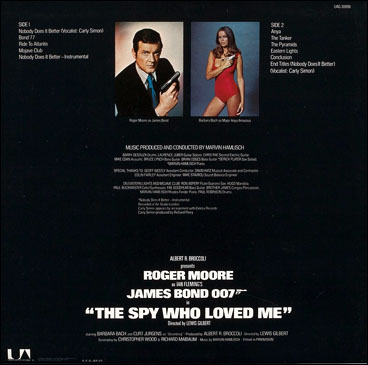 |
|
The Spy Who
Loved Me
Original Motion Picture Score
United Artists Records UAG 30098 Stereo (September 1977) |
The original UK
pressing featured a gatefold sleeve
with a selection of stills from the film |
|
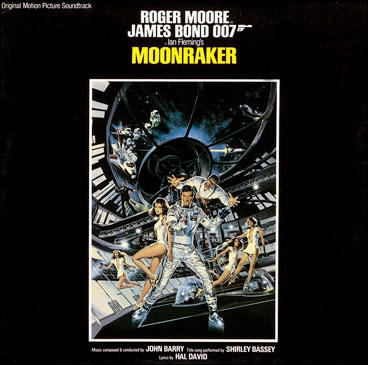 |
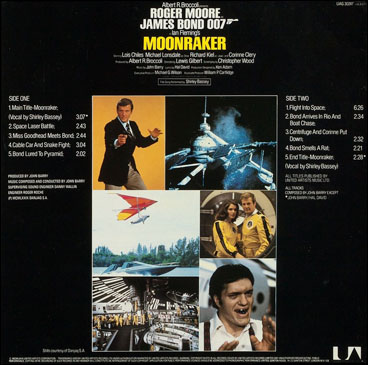 |
|
Moonraker
Original Motion Picture Soundtrack
United Artists Records UAG 30247 Stereo (July 1979) |
|
|
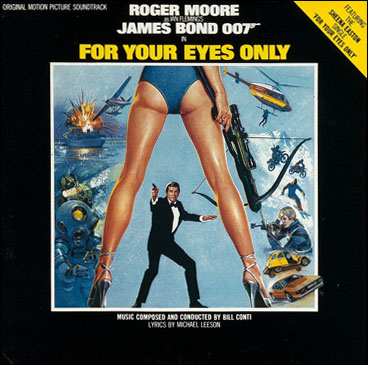 |
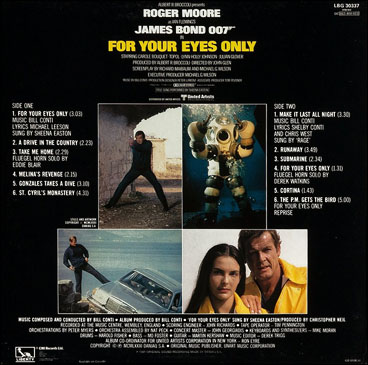 |
|
For Your Eyes
Only
Original Motion Picture Soundtrack
Liberty Records LBG 30337 Stereo (June 1981) |
|
|
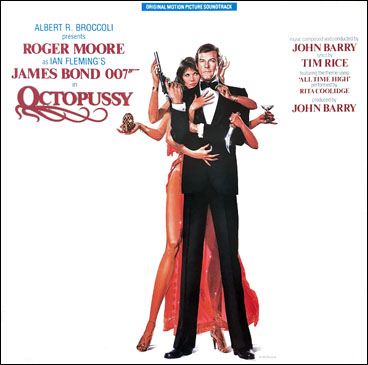 |
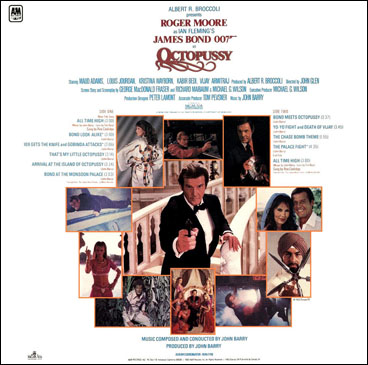 |
|
Octopussy
Original Motion Picture Soundtrack
A&M Records AMLX 64967 Stereo (June 1983) |
|
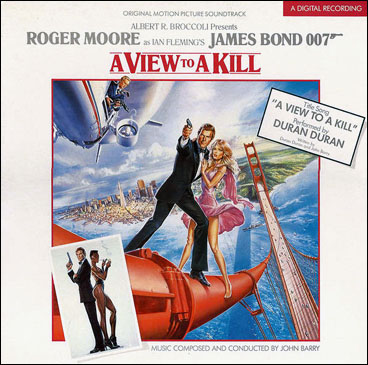 |
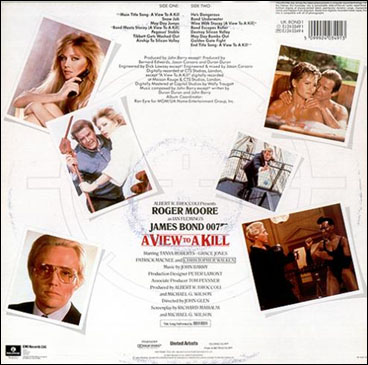 |
|
A View To A Kill
Original Motion Picture Soundtrack
Parlophone 064 24 0349 1 Stereo (June 1985) |
Note: Track #2 ‘May Day
Jumps’ was mis-spelled on subsequent CD releases as ‘May Day Jumpers’ |
|
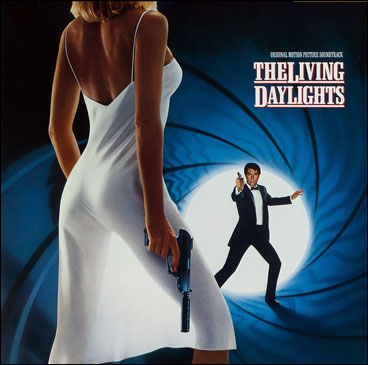 |
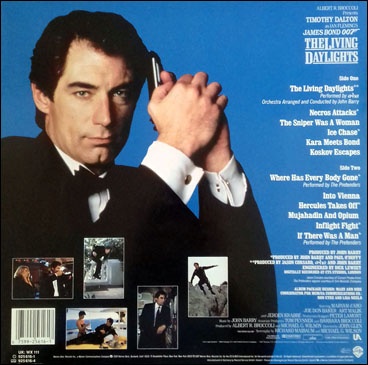 |
|
The Living
Daylights
Original Motion Picture Soundtrack
Warner Bros Records WX 111 Stereo (June 1987) |
|
|
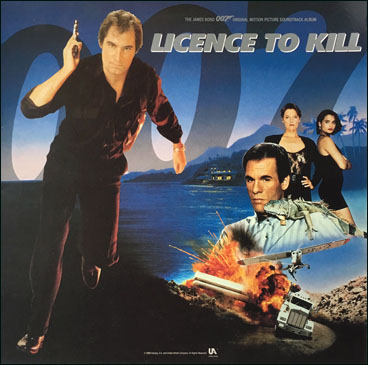 |
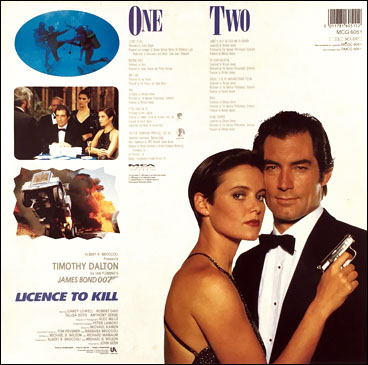 |
|
Licence To Kill
Original Motion Picture Soundtrack
MCA Records MCG 6051 Stereo (July 1989) |
|
|
|
|
After two years-worth
of delays the 25th James Bond film No Time To Die was finally
released in UK cinemas on September 30, 2021. For the first time since
1989 the original soundtrack album was released simultaneously on CD
and vinyl (and a gold cassette edition). The gatefold double-LP is also unique in that it includes
four bonus tracks not featured on the CD version. Listed as the final
four tracks on side two of disc two (Q1 - Q4), the cues do not feature
in the final film and appear to be demo recordings by Steve Mazzaro,
who provided additional music for No Time To Die. The composer
also released another track available to stream exclusively
on his
website. The five-minute cue ‘Safin’ is heard in the pre-credit
sequence of No Time To Die, but not included on the official
soundtrack album. In addition to the black vinyl gatefold double-LP,
No Time To Die was also issued in a variety of different
editions. Two versions of the double-LP were issued as Limited Editions
in gold (#3807384) and white (#3807388) vinyl, and as a
picture disc (#3515880) featuring images of the four main characters in the film.
With an eye on the collectors market, two single picture disc versions
were also released with a truncated version of the soundtrack.
Containing 14 tracks and omitting the bonus cues, the two picture disc
single-LPs featured Bond/Safin and Nomi/Madeleine artwork. |
|
|
|
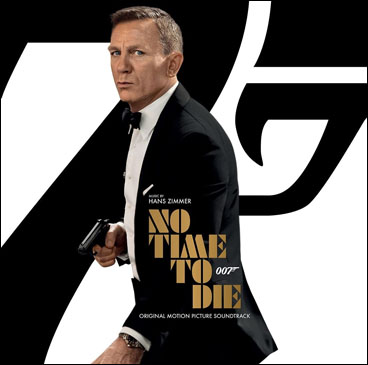 |
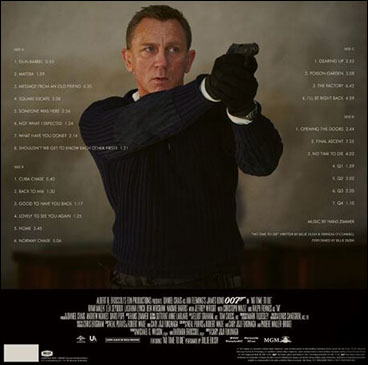 |
|
No Time To Die
[Double-LP]
Original Motion Picture Soundtrack
Decca Records 882338 Stereo (September 2021) |
|
|
![No Time To Die [007 picture disc]](collectibles/records/nttd_lp3.jpg) |
|
No Time To Die
[007 picture disc]
Original Motion Picture Soundtrack
Decca Records 515084 Stereo (September 2021) |
|
![No Time To Die [Bond/Safin picture disc]](collectibles/records/nttd_lp2.jpg) |
![No Time To Die [Nomi/Madeleine picture disc]](collectibles/records/nttd_lp4.jpg) |
|
No Time To Die
[Bond/Safin picture disc]
Original Motion Picture Soundtrack
Decca Records 5392695 Stereo (September 2021) |
No Time To Die
[Nomi/Madeleine picture disc]
Original Motion Picture Soundtrack
Decca Records 5392697 Stereo (September 2021) |
|
|
|
Original
soundtrack?
Although the James Bond albums bear the words ‘Original
Motion Picture Soundtrack [or Score]’ this is not always the case.
Dr. No is a prime example as the album was hastily assembled
after the success of the film in the USA, and never released on record
in the UK until 1965. As with most motion picture recordings, the music heard in the
finished film is often different to that which appears on the soundtrack album
due to subsequent changes in the final sound mix, or cues truncated by
the music editor. Some composers will mount another recording session
(often with
different musicians) for release as the soundtrack album, with
performances often combining several different tracks
into an orchestral suite for a more pleasurable listening experience, omitting many of the shorter
cues which only appear briefly in the film to support the action on screen.
The soundtrack album for The Spy Who Loved Me (1977) by Marvin
Hamlisch was a completely new re-recording of his score, with some
tracks not even appearing in the film. There are also several
instances on the soundtrack albums which feature a different take of a
particular cue to that originally heard in the film. The original
vinyl albums are often therefore unique in that respect, and until the
expanded remastered CD releases from US label La-La Land Records
which began in 2017, the
scores were never presented in film order.
|
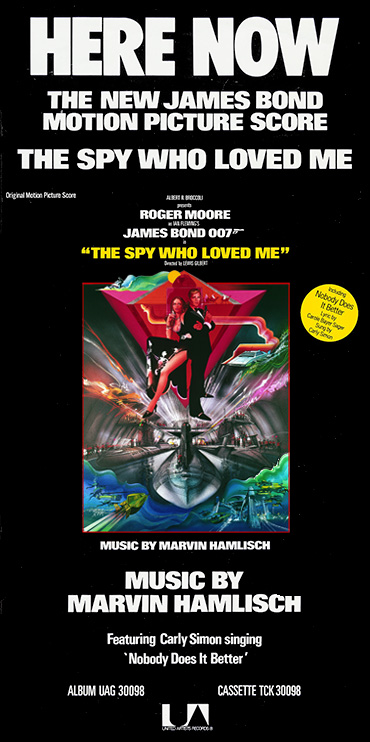 |
For the release of
the expanded and remastered James Bond compact discs issued by
EMI in
2003, American music producer Lukas Kendall in most instances had access to the recording session
master tapes,
and was able to include many pieces not used on the original
soundtrack album. The gun barrel sequence for On Her Majesty's
Secret Service was restored to its rightful place at the start
‘This Never Happened To The Other Feller’, with other films now having this iconic piece of music included
as part of the bonus tracks. Other cues such as
the opening of ‘A Drop in the Ocean’ from
You Only Live Twice and ‘Moon Buggy Ride’ from Diamonds Are
Forever, now have additional passages of music included. Although
the master tapes for The Man With
The Golden Gun did exist and were available to Lukas Kendall in
2002, there were insufficient funds remaining to complete the project,
and they went back on the shelf until the
50th Anniversary re-issue
from La-La Land Records at the end of 2024.
Perhaps the
most frustrating James Bond soundtrack release is The Spy Who Loved
Me composed by Marvin Hamlisch. As the soundtrack album is a
re-recording, many tracks sound very different to how they appeared in
the film, whilst others are unique to the LP. Although the James Bond
soundtracks
are now for the most part greatly expanded from their original release,
and subsequently issued on Compact Disc in vastly superior sound quality to the
earlier editions, many audiophiles are returning to the long playing
record format, and several soundtracks have been re-issued on vinyl in
recent years. Naturally the LP format means fewer tracks, but
sometimes less is more. Many classic albums have a much better
listening experience in their shorter version than those expansions
with every single note of music placed in the correct
running order.
In 2017 US
independent label
La-La Land Records released an
expanded and remastered
Limited Edition Two-Disc CD of David Arnold's
Die Another Day. This was followed by
The World Is Not Enough
in 2018, and Tomorrow Never Dies in 2022. La-La Land
then began releasing remastered and expanded anniversary editions of
the soundtracks starting with Live And Let Die (1973) and
Octopussy (1983) at the end of 2023, and have confirmed the
project is ongoing.
|
|
|
|
|
There is one James Bond record
however that always stood head and shoulders above all else, and whose sound
quality on vinyl made it one of the most
sought-after
recordings of all time. The film is the one that most fans
prefer to forget, but who can forget the outstanding quality of the
music? It can only be 1967's Casino Royale - the film that was
too much for one James Bond!
|
|
|
 |
|
|
|
|
|


